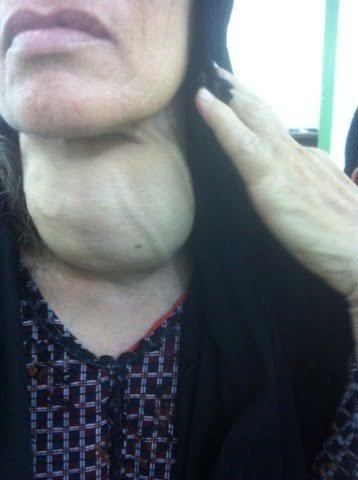Thyroid Nodule
The thyroid is a butterfly-shaped gland located in the neck. Hormones secreted by the thyroid control body metabolism.
The thyroid nodule is the most common endocrine problem, are more common in women, if people exposed to radiation or had Hashimoto’s thyroiditis, the most common cause of hypothyroidism.
The term thyroid nodule refers to any abnormal growth of thyroid cells into a lump within the thyroid. Most thyroid nodules are noncancerous. The evaluation of a nodule is aimed at discovering a potential thyroid cancer.
Thyroid nodules are classified as:
- Solitary (a single nodule).
- Multiple (more than one nodule).
- Cystic (fluid-filled).
- Solid.
What are the symptoms of a thyroid nodule?
Most thyroid nodules do not cause any symptoms. If the nodule is large enough, it may cause difficulty swallowing or shortness of breath if it is pressing on the windpipe. Rarely, hoarseness can be caused if the nodule irritates a nerve to the voice box.
How is the thyroid nodule diagnosed?
Since most patients with thyroid nodules do not have symptoms, most nodules are discovered during a routine physical examination. The initial laboratory tests may include blood tests to measure the amount of thyroid hormones and thyroid-stimulating hormone (TSH) in your blood to determine whether your thyroid is functioning normally. The evaluation of the thyroid nodule might include specialized tests such as a thyroid ultrasound, thyroid fine needle biopsy or a CT scan.
Thyroid ultrasound
This very sensitive test can easily determine the precise size of the nodule. The thyroid ultrasound also can be used to assist the placement of the needle within the nodule during a fine needle biopsy.
Thyroid scan
The thyroid scan uses a small amount of usually radioactive iodine, to obtain a picture of the thyroid gland. Because thyroid cancer cells do not take up radioactive iodine as easily as normal thyroid cells do, this test is used to determine the likelihood that a thyroid nodule contains a cancer. The scan usually gives the following results.
1) The nodule is cold. In other words, the nodule is not taking up radioactive iodine normally. This patient is referred for a fine needle biopsy of the nodule.
2) The nodule is functioning. Its uptake of radioactive iodine is like that of normal cells. A biopsy is not needed right away since the likelihood of cancer is very low.
3) The nodule is hot. Its uptake of radioactive iodine is greater than that of normal cells. The likelihood of cancer is extremely rare, and so biopsy is usually not necessary.
Thyroid fine needle biopsy samples will be taken from different parts of the nodule to give the best chance of finding cancerous cells by the Pathologist.
How are thyroid nodules treated?
All thyroid nodules that are found to contain a thyroid cancer, or that are highly suspicious of containing a cancer, should be removed surgically by a head and neck surgeon. Most thyroid cancers are curable and rarely cause life-threatening problems.
When to see a doctor
Although most thyroid nodules are noncancerous and don’t cause problems, ask your doctor to evaluate any unusual swelling in your neck, to evaluate the possibility of cancer.
Seek medical care if you develop signs and symptoms of hyperthyroidism:
- Sudden weight loss even though your appetite is normal or has increased
- A pounding heart
- Trouble sleeping
- Muscle weakness
- Nervousness or irritability
OR
If you have signs and symptoms of hypothyroidism:
- Feeling cold
- Feeling tired more easily
- Dry skin
- Memory problems
- Depression
- Constipation


Recent Comments